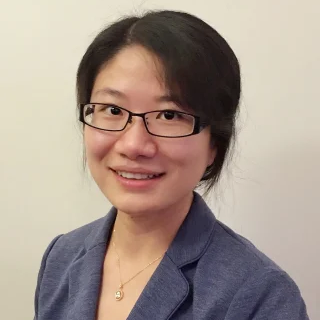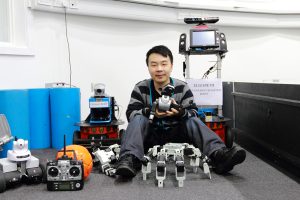September 2026
Full time
18 months
Suzhou
Academy of Future Education
This programme leads to a University of Liverpool degree which is recognised by Ministry of Education, China.
Knowledge and skills
There are three pathways for students enrolled in the MA Child Development and Family Education programme to choose from:
- The Family and Social Work Pathway equips students to drive positive change in family and social settings. It covers multiple influential factors such as family education, child and adolescent mental health, and programme development. Emphasising holistic support, it addresses evolving needs in social and familial contexts, exploring the intersection of family dynamics and mental health.
- The Educational Psychology and Counselling Pathway is designed to equip students to become effective counsellors and advocates for individuals with diverse learning needs. Its modular curriculum places a strong emphasis on theories and practices related to counselling, special education, and tailored intervention strategies for diverse populations, ensuring students are prepared to provide effective support and instruction across educational settings.
- The Teaching and Learning Pathway equips students to enhance educational systems through teaching and leadership roles, emphasising innovative teaching practices and assessment and evaluation. Students gain expertise in K-12 programmes and classroom management, fostering an understanding of global education trends and the skills to drive positive change within diverse learning environments.
This programme moulds students into compassionate professionals with cutting-edge knowledge, innovative thinking, and transformative skills. Students and teachers work together to build bridges between theory and practice to gain an interdisciplinary perspective of child development and family education. Through the programme, we foster new generations of leaders ready to meet the evolving challenges of the 21st century.

Dr Wei Deng
Programme Director
Modules
*Programme modules listed are illustrative only and subject to change. XJTLU students are advised to log in to the e-Bridge Portal to view the effectuated module structure.
Semester 1
Core Modules
Optional Modules
Semester 2
Core Modules
Optional Modules
Semester 3
Core Modules
Semester 1
Core Modules
Optional Modules
-
Understanding Families in Educational and Community Settings
-
Developing and Evaluating Programmes for Children and Families
Semester 2
Core Modules
Optional Modules
Semester 3
Core Modules
Semester 1
Core Modules
Optional Modules
Semester 2
Core Modules
Optional Modules
Semester 3
Core Modules
The University offers a broad range of activities aiming to enrich master students’ theoretical and experiential learning and professional development. Training, workshops and seminars, covering varieties of themes and topics, both generic and subject-specific, are often offered at both University and Academy/department levels. The Academy of Future Education and the Department of Educational Studies often invite scholars and professionals for featured lectures and workshops. You may be provided with opportunities to work as a teaching assistant, research assistant, or intern at XJTLU. Field trips or enterprise/organization visits may also be organized. Such courses or activities will not only support your academic studies in the master’s programme, but also provide you with important skills and capabilities for future employment and professional development.
Timetable
Modules may be scheduled any time between 9:00 and 20:00, from Monday to Saturday, and are delivered onsite, with some sessions potentially incorporating flexible online components to enhance learning.
Careers
Most graduates of this major take up positions in public schools, international schools, and educational institutions, contributing to family education services, social welfare, and learning support. Their employers include the Institute of Psychology of the Chinese Academy of Sciences, Beijing Normal University, Xi’an Jiaotong-Liverpool University, Duke Kunshan University, Guangzhou Open University, Sichuan Judicial and Police Officers Vocational College, Shanghai Star River Bilingual School, Overseas Chinese Academy of Concord Suzhou, High School Affiliated to Sichuan Normal University, the Psychological Teacher Post for Talent Introduction in Yancheng Economic and Technological Development Zone, New Oriental Education & Technology Group Co., Ltd., etc.
Students have the opportunity to participate in the co-compilation and publication of journals and papers, demonstrating their professional capabilities to employers and the academic community. By collaborating with academic mentors on research projects and academic activities, students can enrich their personal resumes, accumulate presentation experience, and connect with industry practitioners and outstanding scholars in the field—laying a solid foundation for competing for high-quality positions and pursuing further studies in the future.
Whether your goal is frontline practical work, project coordination and management, or pursuing a doctoral degree, this major will build a clear career development path for you and help you translate classroom learning into practical influence in industry practice.


















Overview
The family is a child’s first school, and parents are their first teachers. As such, the quality of family education directly affects children’s physical and mental health. With the rapid growth of information technology in the 21st century, the next generation of parents is experiencing unprecedented challenges and changes in the typical family structure, leading to an increasing focus on child development and family education (CDFE). However, there is currently a lack of family education professionals to meet this growing need. These new professionals must not only understand child development but also be qualified to provide therapeutic relief for families facing challenges in the modern world. This MA programme aims to help learners gain in-depth knowledge, skills and hands-on experience in child development and family education through the combination of research-led and practice-oriented modules. With three different pathway options, Family and Social Work, Educational Psychology and Counselling, and Teaching and Learning, the CDFE MA programme focuses on the cultivation of transferable skills and innovative thinking to ensure our graduates achieve great success in their future careers. This programme provides the foundation for the home-school-community education paradigm that is rapidly gaining traction throughout society.
The Academy of Future Education boasts an international academic staff team and learning environment. Over 95% of its teaching staff have overseas study and work experience, and they are graduates from world-renowned top universities including Harvard University, University of Oxford, University of Cambridge, University of Pennsylvania, University of Hong Kong, Columbia University, etc.
Why study MA Child Development and Family Education at XJTLU?
This programme offers three distinct pathways aligned with diverse student interests and evolving sector needs. Pathway focuses typically include family education and parenting support, school-based wellbeing and counselling, and special/inclusive education. Project-based learning is embedded in every module so you can address real briefs from educational settings, collaborate in multidisciplinary teams, and graduate with a portfolio of evidence-based solutions. With a growing shortage of CDFE specialists—and rising demand for professionals in family education, mental health and counselling, and special needs education—our practice-informed curriculum equips you with the knowledge, practical tools, and confidence to meet urgent workforce needs.
By studying MA Child Development and Family Education, you will have: